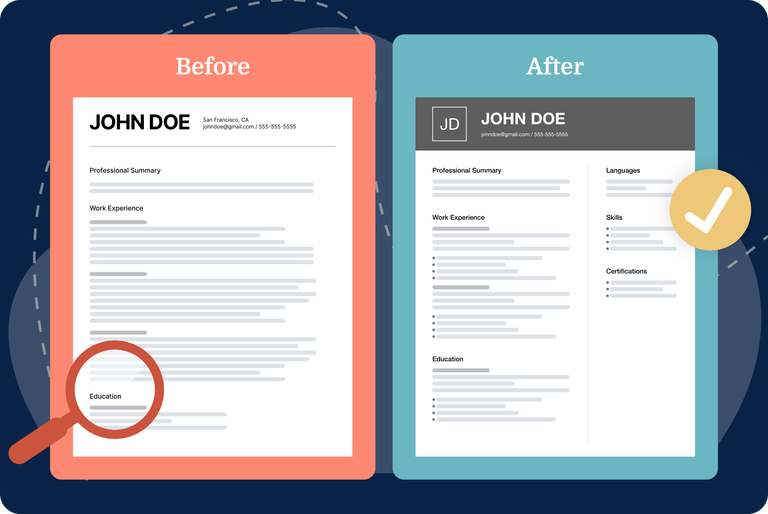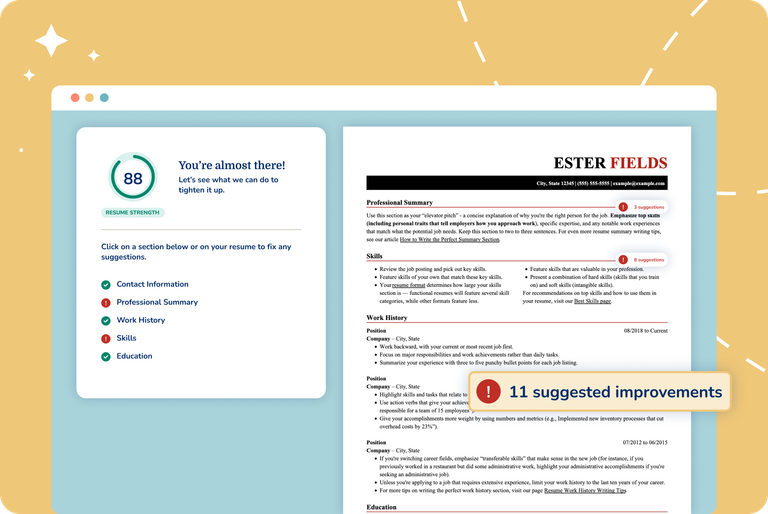Our customers have been hired at: *Foot Note
AI Resume Skills Generator

In today's competitive job market, highlighting your organizational skills on your resume can distinguish you from other candidates. Organizational skills are crucial across various roles and levels within an organization. Whether managing multiple tasks efficiently or coordinating projects seamlessly, these skills showcase your capacity to stay organized and achieve objectives effectively.
Here we offer examples of essential organizational skills to feature on your resume and practical advice for mastering and implementing them in the workplace. Check out our guide, How to Write a Resume, for tips and strategies on crafting a resume that emphasizes your organizational strengths.
What are organizational skills?
Organizational skills refer to the ability to efficiently manage time, resources, and responsibilities to achieve goals effectively. These skills encompass a range of abilities that help individuals stay focused, productive, and structured in their approach to tasks and projects.
Effective organizational skills enable individuals and teams to navigate complex workflows, meet deadlines consistently, and maintain clarity amidst multiple tasks. Ultimately, mastering organizational skills fosters a more efficient and harmonious work environment, enhancing both individual performance and overall productivity.
Top organizational skills for your resume
Organizational skills are fundamental in the workplace, serving as pillars for operational efficiency and team effectiveness. These skills enable individuals to manage tasks systematically, allocate resources wisely, and maintain structured workflows essential for achieving organizational goals.
Here are ten key organizational skills to help you boost productivity, enhance collaboration, and achieve your career goals.
Time management: Prioritizing tasks, setting deadlines, and allocating time effectively are essential for meeting goals and deadlines.
Task prioritization: Identifying and focusing on the most important tasks first ensures that critical objectives are accomplished efficiently.
Planning and scheduling: Creating action plans, setting milestones and scheduling tasks systematically help achieve long-term and short-term objectives.
Attention to detail: Paying close attention to details minimizes errors, ensures accuracy and maintains high-quality standards in work output.
Information management: Organizing and managing information efficiently, whether it's digital files, emails, or physical documents, ensures easy retrieval and prevents information overload.
Communication skills: Strong communication skills foster effective collaboration, reduces misunderstandings and enhances team productivity.
Adaptability: Flexibility in changing work environments or situations allows for quick adjustments and problem-solving.
Decision making: Making informed decisions based on analysis, critical thinking, and available information is crucial for effective problem-solving and achieving goals.
Multitasking: Balancing multiple tasks or projects simultaneously while maintaining focus and quality is a valuable organizational skill in fast-paced work environments.
Stress management: Developing strategies to manage stress, stay calm under pressure, and maintain productivity during challenging situations contributes to overall organizational effectiveness.
Examples of organizational skills in the workplace
Using organizational skills in the workplace involves meticulously managing time and tasks, prioritizing responsibilities to meet deadlines effectively, and maintaining a systematic approach to workflow management. For ideas on how to include leadership skills in your resume, explore our library of resume examples.
Here are some examples of how you might apply organizational skills in various workplace scenarios:
Time management
Scenario: You have multiple deadlines approaching simultaneously.
Application: Create a detailed schedule or timeline, prioritize tasks based on urgency and importance, break down larger projects into smaller, manageable tasks, and use techniques such as the Pomodoro method to stay focused and productive.
See also:
Task prioritization
Scenario: Your team is overwhelmed with tasks, so you must determine which ones to tackle first.
Application: Assess the urgency and impact of each task, identify critical deadlines or dependencies, consult with team members to gather input, and allocate resources accordingly to address high-priority tasks first.
Communication skills
Scenario: There is a misunderstanding between team members regarding project requirements.
Application: Facilitate a team meeting to clarify expectations and resolve misunderstandings, actively listen to each person's perspective, provide clear and concise explanations, and encourage open dialogue to ensure everyone is on the same page.
Information Management
Scenario: You need to access crucial project documents quickly during a client meeting.
Application: Organize digital files in a centralized folder structure with clear naming conventions, maintain a document management system with version control, and use tools like cloud storage or project management software for easy access from any location.
Planning and scheduling
Scenario: Your team is starting a new project with tight deadlines.
Application: Develop a comprehensive project plan outlining objectives, deliverables, milestones, and timelines. Identify potential risks and mitigation strategies, allocate resources effectively, and regularly review and adjust the plan as needed.
Problem-solving
Scenario: Your team encounters unexpected obstacles during project implementation.
Application: Analyze the root causes of the problems, brainstorm potential solutions with team members, evaluate the pros and cons of each option, implement the most viable solution, and monitor the results to ensure effectiveness.
Adaptability
Scenario: There are significant changes in project scope or requirements.
Application: Remain flexible and open-minded in response to changes, assess the impact on timelines and resources, communicate updates to stakeholders, and adjust plans and strategies accordingly to accommodate new circumstances.
Attention to detail
Scenario: You are reviewing a report before submission to a client.
Application: Scrutinize the document carefully for errors, inconsistencies, or formatting issues, cross-check data and calculations for accuracy, and ensure that all information is presented clearly and professionally.
Multitasking
Scenario: You are juggling multiple projects with overlapping deadlines.
Application: Prioritize tasks based on deadlines and importance, allocate specific time blocks for each project, avoid distractions by focusing on one task at a time, and use tools like project management software or task lists to stay organized.
Leadership Skills
Scenario: Your team is experiencing low morale and decreased productivity.
Application: Lead by example by demonstrating enthusiasm and commitment, provide support and encouragement to team members, foster a positive work environment through effective communication and recognition of achievements, and collaborate with the team to identify and address underlying issues.
See also:
Organizational skills for leaders
Leaders with robust organizational skills also cultivate a supportive and inclusive work environment by leveraging empathy, emotional intelligence, and effective conflict resolution. They exhibit adaptability in response to evolving business landscapes and motivate teams through encouragement, recognition, and opportunities for professional growth.
Ultimately, organizational skills empower leaders not only to achieve organizational goals but also to inspire and enable their teams to reach their full potential.
Key organizational skills for leaders include:
- Strategic planning: Developing and communicating a clear vision for future goals and objectives.
- Communication: Clearly conveying information and directives to ensure team alignment and understanding.
- Decision-making: Making well-informed choices that support organizational objectives and empower teams.
- Problem-solving: Addressing challenges proactively to foster innovation and organizational growth.
- Time management: Efficiently allocating resources and prioritizing tasks to meet deadlines and achieve strategic goals.
- Adaptability: Responding flexibly to changes and uncertainties in the business environment.
- Team development: Building cohesive teams through mentoring, coaching, and fostering a culture of collaboration.
- Customer focus: Prioritizing customer needs and enhancing satisfaction to drive business success.
How to improve your organizational skills
Continuously developing your organizational skills is key to your success, the success of the teams you lead and ultimately to the success of the organization you work for.
Here are some tips for improving your organizational skills:
- Prioritize your tasks. Task prioritization includes prioritizing tasks based on urgency and importance so you can focus on high-impact activities that contribute to career advancement and organizational goals.
- Set clear goals. Goal setting means setting clear, achievable goals for direction and motivation for career growth. Breaking down goals into actionable steps and tracking progress ensures steady advancement.
- Manage your resources. Resource management involves allocating and using resources such as time, money, personnel, and materials to achieve company goals. This demonstrates leadership and strategic decision-making, which are valuable for professional advancement.
- Manage information. Information management includes storing, organizing and managing data or information in a systematic and efficient manner, opening opportunities for leadership roles and career progression.
- Create schedules. Scheduling involves planning and organizing activities, events, or tasks over a specific period to enhance your performance and reputation within organizations and open doors to growth opportunities.
- Define your short-term and long-term goals, and prioritize them based on importance and urgency. Break down large goals into smaller, actionable tasks to make them more manageable and achievable.
- Use organizational tools and techniques such as calendars, planners, to-do lists, and digital apps to keep track of tasks, deadlines and appointments. Experiment with different tools to find what works best for your workflow and preferences.
- Develop systems and routines for organizing your workspace, information and tasks. Create filing systems for documents, establish daily or weekly routines for planning and reviewing tasks, and stick to consistent habits to maintain organization.
- Improve your time management skills by setting aside dedicated time blocks for specific tasks, minimizing distractions, and avoiding procrastination. Use techniques like the Pomodoro method or time blocking to stay focused and productive.
Resources for developing organizational skills
Whether you have many years of work experience or are applying for your first job, effective organizational skills are crucial for personal and professional success. Continuous learning is key to sharpening and developing new skills.
Here is a short list of reources to help you succeed.
- Books: Utilize books on time management and organization to learn various strategies and frameworks for prioritizing tasks and managing schedules effectively. Apply the techniques mentioned in the books consistently to build sustainable organizational habits.
- Online courses: Enroll in online courses focused on productivity and organizational skills to gain structured knowledge and actionable steps. Use exercises and assignments to practice new techniques and integrate them into your daily routine.
- Workshops and seminars: Attend workshops and seminars on organizational skills to engage in interactive learning experiences and receive real-time feedback. Network with other participants to exchange tips and strategies for improving efficiency and effectiveness.
- Productivity apps: Use productivity apps like Todoist or Trello to create task lists, set deadlines, and track project progress. Explore features such as reminders and integrations with calendars to streamline your workflow and stay organized on a daily basis.
- Coaching and mentoring: Seek out a professional coach or mentor who specializes in organizational development to receive personalized guidance and accountability. Schedule sessions regularly to discuss challenges, set goals and receive feedback on improving your organizational skills.
- Podcasts and blogs: Listen to podcasts and read blogs focused on productivity and time management to discover new strategies and insights from experts. Implement actionable tips discussed in episodes or articles to experiment and adapt what works best for your organizational needs.
Key takeaways
Let's review what you’ve learned about organizational skills from this guide:
- Strong organizational skills can enhance productivity, foster collaboration and help you advance your career.
- By increasing your productivity, you create a pathway to career advancement opportunities.
- Using organizational skills in the workplace involves meticulously managing time and tasks.
- Organizational skills are paramount for leaders.
- Mindfulness, improving communication skills and practicing time management strategies and tactics can help you develop your organizational skills.
FAQ
What are organizational skills?
Organizational skills refer to the ability to effectively manage and coordinate tasks, resources and information to achieve goals systematically and efficiently. These skills encompass various aspects such as time management, task prioritization, goal setting and effective communication.
Why are organizational skills important in the workplace?
Organizational skills are essential in the workplace because they increase productivity, efficiency and effectiveness. By staying organized, individuals can meet deadlines, handle multiple tasks, and collaborate effectively with colleagues, leading to improved job performance and success.
How can I improve my organizational skills?
mproving organizational skills involves adopting several strategies and practices to enhance efficiency, productivity, and overall effectiveness in managing tasks and responsibilities. Here are some practical tips to help you improve your organizational skills:
- Set clear goals and priorities: Define your short-term and long-term goals. Prioritize tasks based on their urgency and importance to stay focused on what matters most.
- Create to-do lists: Use daily or weekly to-do lists to organize tasks. Break down larger projects into smaller, manageable steps. Check off tasks as you complete them to track progress.
- Use a planner or organizer: Utilize digital or physical planners to schedule appointments, deadlines, and tasks. Set reminders to stay on track with your commitments.
- Manage your time effectively: Allocate specific time blocks for tasks and avoid multitasking. Use techniques like the Pomodoro Technique (working in focused intervals) to maintain concentration.
- Declutter your workspace: Keep your physical and digital workspace organized. Clear out unnecessary items and files regularly to reduce distractions and improve efficiency.
- Develop systems and processes: Create efficient workflows for recurring tasks. Standardize how you handle emails, documents, and project updates to streamline operations.
- Improve your decision-making skills: Practice making informed decisions promptly. Evaluate options based on priorities, available resources, and potential outcomes.
- Enhance your communication skills: Clear communication prevents misunderstandings and ensures tasks are completed correctly and on time. Be concise, ask questions when needed, and provide clear instructions.
- Delegate appropriately: Recognize when tasks can be delegated to others. Delegate based on team strengths and workload balance to free up time for higher-priority tasks.
- Continuously learn and adapt: Stay open to new tools, techniques, and best practices in organization. Reflect on what works well and what can be improved, and adjust your approach accordingly.
How can I demonstrate my organizational skills during a job interview?
You can demonstrate your organizational skills during a job interview by providing specific examples of how you have effectively managed your time, prioritized tasks, and achieved goals in previous roles. Highlight any relevant experiences or accomplishments that showcase your ability to stay organized and handle responsibilities efficiently.
Why are organizational skills important to employers?
Organizational skills are vital to employers because they directly impact the efficiency, productivity and overall success of a workplace. Employees with strong organizational skills can manage their time effectively, prioritize tasks, and maintain a structured workflow, ensuring that deadlines are met and projects are completed accurately and efficiently. This proficiency helps to minimize errors and reduce the risk of missed opportunities or critical oversights.
How can I highlight organizational skills on my resume?
To effectively highlight organizational skills on your resume, focus on specific achievements and experiences that demonstrate your ability to manage tasks, prioritize effectively, and streamline processes. Use bullet points to showcase instances where you successfully coordinated projects, met deadlines consistently, or improved operational efficiency.
Highlight any roles where you were responsible for managing multiple tasks simultaneously, organizing events or schedules, or implementing systems that enhanced productivity. Additionally, mention any software or tools you are proficient in (e.g., project management software, calendars) to underscore your organizational capabilities and make them tangible to prospective employers.
Our customers have been hired at:*Foot Note













